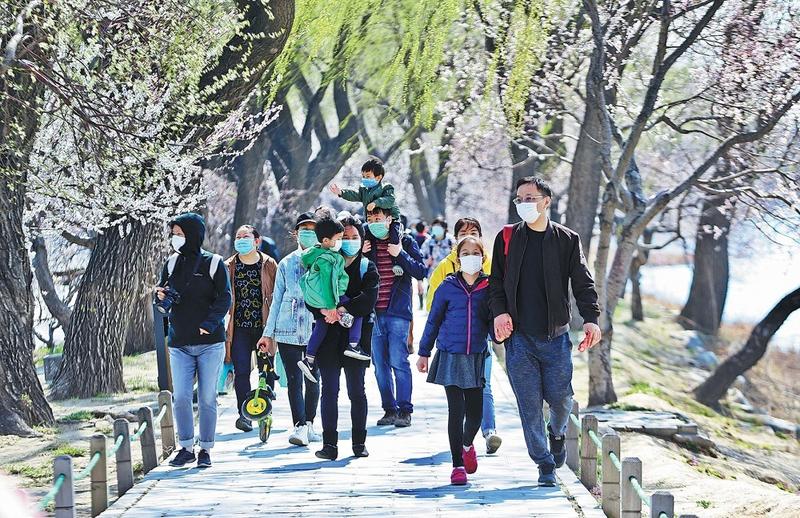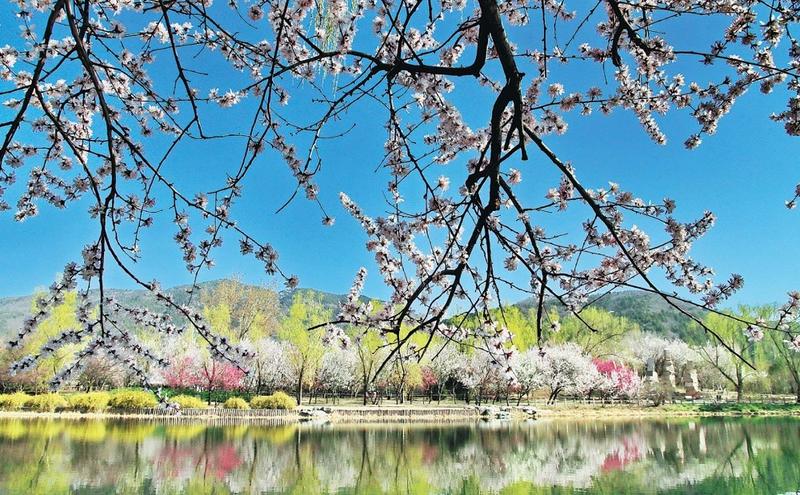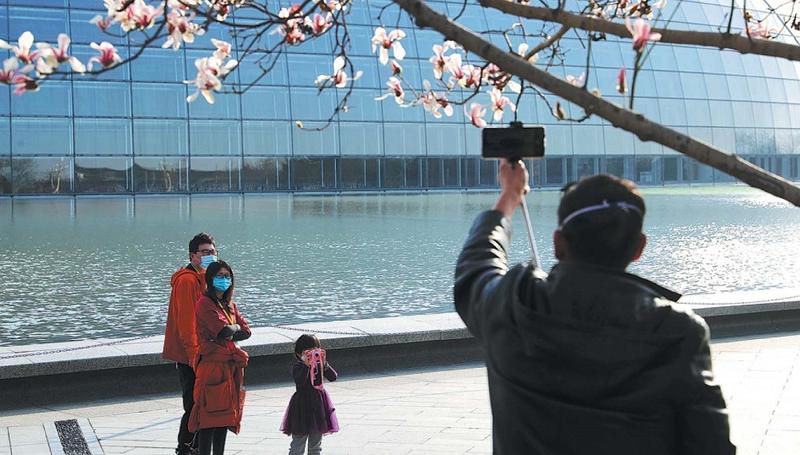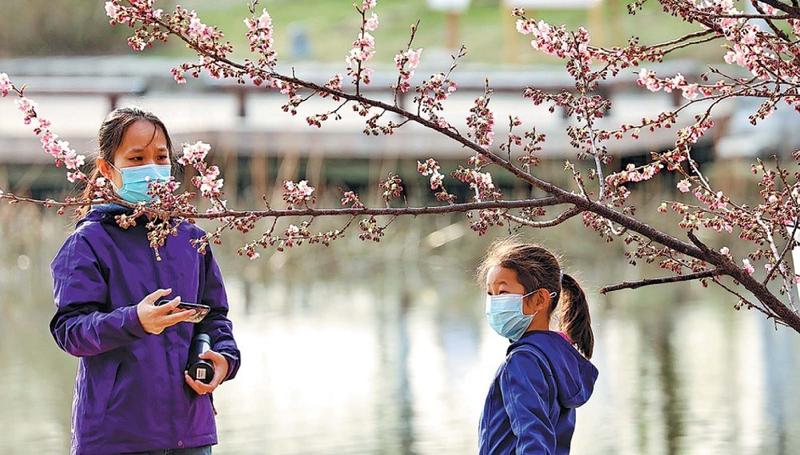 People wearing face masks admire the beautiful blossoms as they walk at the Summer Palace in Beijing, on March 22, 2020. (ZOU HONG / CHINA DAILY)
People wearing face masks admire the beautiful blossoms as they walk at the Summer Palace in Beijing, on March 22, 2020. (ZOU HONG / CHINA DAILY)
With flu-like symptoms-sneezing, coughing and a runny nose-26-year-old Liu Yang went to hospital two times for a series of checks, only to be told she was allergic to pollen.
While that comforted Liu and her parents, who were concerned about novel coronavirus pneumonia, the results did not convince her colleagues, who kept urging her to have another checkup.
Warmer spring weather brings misery to some people. As plants begin to blossom and germinate, people allergic to pollen and willow catkins exhibit symptoms including coughing, sneezing and breathing difficulties.
The symptoms can make other people nervous, worrying that the allergy sufferer could be infected with the novel coronavirus.
Anyone would be nervous in this special period if they had such symptoms because novel coronavirus pneumonia can be fatal and anyone infected could be in big trouble.
Liu Yang, An accountant from Zhengzhou, China
According to data issued by the nation's health authorities, more patients infected with novel coronavirus have recovered and been discharged from hospital, with newly diagnosed infections on the Chinese mainland mainly imported from overseas.
Work and production is gradually resuming in an orderly manner in various regions and industries, with more people appearing on the streets and commuting to work.
But while China's epidemic prevention and control work is bearing fruit, even the slightest symptoms of a respiratory ailment can worry some people.
Inner turmoil
Liu, from Zhengzhou, Henan province, has been working as an accountant for a startup company in Beijing's Chaoyang district for about two years.
She returned to Beijing following the Spring Festival holiday in late January. After spending 14 days in quarantine, Liu has always worn a surgical mask whenever she leaves her rented apartment. One reason is that the health authorities have repeatedly asked the public to wear masks to prevent transmission of the virus, the other is to protect herself from the pollens she is allergic to.
Her company began asking some employees to work in the office early last month. Since then, she has donned a face mask, goggles and a hat whenever she ventures outdoors, but the protection they offer from pollens is not perfect.
One morning, about two weeks ago, Liu started to sneeze and cough while on her way to work. She wasn't sure whether her flu-like symptoms were caused by her pollen allergy or something else.
"I couldn't focus on my work that day and thought many times about where I had been and whether I was likely to have been in contact with anyone related to a novel coronavirus patient since returning to Beijing," she said.
 This March 22, 2020 shows colorful blossoms at the Beijing Botanical Garden in Beijing, capital of China. (LIU XIANGUO / XINHUA)
This March 22, 2020 shows colorful blossoms at the Beijing Botanical Garden in Beijing, capital of China. (LIU XIANGUO / XINHUA)
Liu said she tested her temperature every three hours that day and all of the readings were within the healthy range during the day time, but with a rising trend. That night it was 37.1 C, which worried her so much that she couldn't face eating dinner.
"I called my parents and told them I might have a fever, which also made them extremely anxious, as we know that fever is one of the key features of novel coronavirus infection," she said. "Then my parents calmed me down and asked me to take some drugs for seasonal flu and have a good rest."
However, the medicine didn't alleviate her symptoms and her eyes started to itch that night. She sent a text message to her boss, reported her situation and asked for a day off to have a medical checkup.
"I thought about a lot that night," Liu said. "If I got infected, what should I do? Who was I going to call? Who would take care of my parents? Whether my boss would deduct my salary or even fire me because I couldn't work … a picture of an infected patient lying on a bed with a pipe connected to a ventilator even appeared in my mind."
She finally fell asleep, suspecting afterward that the medicine might have helped. The first thing she did after waking up was to test her temperature again. The result, 36.2 C, made her feel much better as it was well under the 37.3 C signifying a mild fever.
"Anyone would be nervous in this special period if they had such symptoms because novel coronavirus pneumonia can be fatal and anyone infected could be in big trouble," Liu said.
Office pressure
When she went to the hospital's clinic, the doctor told her she was just allergic to pollen after taking her temperature, checking her symptoms and asking her multiple questions. The doctor said more time would be needed to figure out exactly what she was allergic to.
Liu told her parents about the consultation later that day after her symptoms were relieved by medicine prescribed by the doctor, but they asked her to have another checkup the next day to make sure she had no symptoms related to novel coronavirus infection.
"My parents' request may sound like an overreaction, but it was out of their concern, so I did go to the hospital to check again," she said.
The next day, on her second visit to the hospital, a doctor calmed Liu down and said her symptoms were quite common among allergic patients and were not necessarily related to flu or pneumonia, adding that the most important thing was to figure out the source of the allergy.
It was last year, during her first spring in Beijing, that Liu discovered she had allergies.
She began coughing and sneezing and thought she had a cold or flu, two common illnesses at that time of the year.
Her symptoms were relieved after a doctor prescribed some medicine. But the doctor didn't find the source of the allergic reaction and asked her to take daily notes and watch out for any change in her physical health.
"I didn't have contact with so many kinds of pollen when I was in my hometown," Liu said. "Last year was my first time to have such symptoms, so I had no idea what caused it."
 A visitor takes selfies under a flowering magnolia tree at the National Grand Theater in Beijing on March 11, 2020. (ZENG JIA / FOR CHINA DAILY)
A visitor takes selfies under a flowering magnolia tree at the National Grand Theater in Beijing on March 11, 2020. (ZENG JIA / FOR CHINA DAILY)
Her time in quarantine meant she had less exposure to pollen early on and her allergy symptoms appeared later this year.
But even though she got the allergy diagnosis confirmed at two checkups, her colleagues were still concerned.
"I told my boss that I had been checked twice and was just allergic to pollen, but she still politely asked me to work at home for a week and then get one more check, which made me quite embarrassed," Liu said.
"Some of my colleagues also texted me to comfort me and inquire about my symptoms. Then they implied that one more check would be good for everyone."
Liang Yan, who works as a computer support technician for a visual effects company in Beijing, was also asked by his employer to have a medical checkup because he was coughing, had a runny nose and was exhibiting other cold symptoms.
Liang, 28, first noticed the symptoms after his return to the office. At first his eyes itched, and then he began coughing and feeling tired.
"I have an allergic history, so I told myself it must be the same pollen allergy as before, but the continuous coughing made me nervous," he said. "I didn't know whether it was caused by the allergy or a cold, or the ongoing novel coronavirus pneumonia."
Liang started to have allergy symptoms, usually in springtime, when he was in high school in his hometown in Anhui province. They affected him a lot, but his parents thought he was just unwilling to focus on his studies and didn't pay too much attention to his sneezing, coughing and tiredness-symptoms that usually disappeared in two or three weeks.
He received his first medical treatment for his allergies after entering university in Beijing about eight years ago, when his condition was quite severe. He later discovered he was allergic to willow catkins and certain kinds of pollen.
"At that time, I was dizzy and had chest tightness and difficulty breathing," Liang said. "Since then, I've been very careful when I'm outdoors in the spring, as Beijing has many willows and different kinds of flowers."
There were more than 280,000 female willow trees growing within Beijing's fifth ring road last year, according to the city's Gardening and Greening Bureau, which is the main reason why catkins fly all over the capital each spring.
Pollen concentration monitoring by the Beijing Meteorological Service showed levels in the capital were extremely high last month, and people with pollen allergies were urged to avoid going out.
Liang went to the emergency treatment center at a hospital in Changping district because he thought the normal clinic might have been crowded and he wanted to avoid contact with too many people.
The medical staff asked him a series of questions, such as whether he'd had any contact with confirmed or suspected novel coronavirus patients or whether he had traveled abroad and to other highrisk places during the previous two weeks. They also checked his temperature twice.
"I passed a series of medical checks and the doctor finally diagnosed that I was allergic to pollen, which was accompanied by a common cold that may have been caused by the changeable weather," Liang said.
The diagnosis calmed his nerves and his allergic symptoms subsided after medication, although he still has a cold.
 Two girls admire the cherry blossoms at Yuyuantan Park in Beijing, March 21, 2020. (LIU XIANGUO / XINHUA)
Two girls admire the cherry blossoms at Yuyuantan Park in Beijing, March 21, 2020. (LIU XIANGUO / XINHUA)
No need to panic
At home, Liang's roommate kept the windows and doors open for good ventilation after noticing him coughing and sneezing, but the opened windows also bothered Liang, since willow catkins and pollen could get into the room and settle on clothes, causing his symptoms to recur.
"I can understand his concerns during this special period, and the health authorities have also recommended the public open windows and doors to get more fresh air," Liang said. "But these tiny things exist everywhere. I've discussed shortening the time the windows are open with my roommate, and I now wear a mask when they're open."
Chen Hao, a 30-year-old real estate agent in Beijing's Haidian district, said his two roommates had reacted in a similar fashion.
Chen has been allergic to pollen since high school, and started to cough, sneeze and scratch his arms frequently early last month. Chen explained his allergy history to his roommates, but they still often keep their door open for ventilation.
Like Liu and Liang, he struggled with whether to go to hospital, worrying about the risk of novel coronavirus infection but also concerned he could suffer from his allergies for weeks.
"On my way to the hospital, the taxi driver opened all the windows when he found I had a cough and was sneezing, even though we both wore masks," Chen said. "We didn't say anything during 30 minutes of depressing travel. The moment I got out of the car, I told him I was just allergic and he didn't need to worry."
After his visit to the hospital, Chen thought about why the public is so afraid of the virus.
"I was afraid of cross-infection, and so was the driver," he said. "But we don't have to be, as long as everyone takes proper protective measures such as wearing masks and paying attention to personal hygiene.
"There is no need to overreact or panic, since the fight against the epidemic is being won."


